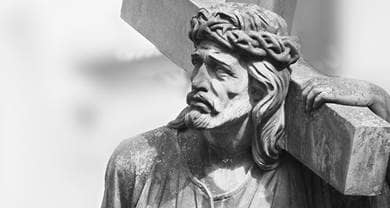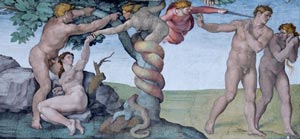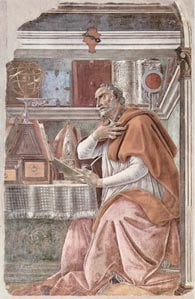- Trending:
- Olympics
- |
- Forgiveness
- |
- Resurrection
- |
- Joy
- |
- Afterlife
- |
- Trump

RELIGION LIBRARY
Christianity
Human Nature and the Purpose of Existence
 Christianity teaches that the universe was created through love by an intelligent power, namely the God of the Bible. Creation was purposeful, not arbitrary, and therefore the universe is not morally neutral, but fundamentally good. In this purposeful creation, everything and everyone is intrinsically valuable. God's design or purpose for creation reflects God's intention that all creatures enjoy perfect love and justice. God works in human history to fulfill that purpose. God created human beings in the divine image, enabling humans to have some understanding of God and of God's vast and complex design. The purpose of life is to love and serve God in order to help bring about God's glorious plan for creation.
Christianity teaches that the universe was created through love by an intelligent power, namely the God of the Bible. Creation was purposeful, not arbitrary, and therefore the universe is not morally neutral, but fundamentally good. In this purposeful creation, everything and everyone is intrinsically valuable. God's design or purpose for creation reflects God's intention that all creatures enjoy perfect love and justice. God works in human history to fulfill that purpose. God created human beings in the divine image, enabling humans to have some understanding of God and of God's vast and complex design. The purpose of life is to love and serve God in order to help bring about God's glorious plan for creation.
Reason is a unique gift bestowed by God on humans and enables them to reflect on their own nature and conscience, and from that derive knowledge of God's will for creation. But a complete understanding is beyond human reach. To fulfill the goal of wholeness in an existence perfected by both justice and love, something more is needed. Humans are not expected to accomplish the divine plan alone. The fulfillment of God's purpose depends on God's grace. For Christians, grace is God's freely-given favor and love.
Reason is a good gift, sometimes misused for selfish, willful, or prideful purposes. The substitution of selfish ambition for God's will is a condition that Christians call sin, meaning separation or alienation from God.
 The Christian concept of sin originates in the story of Adam and Eve found in chapters 2-3 of the Book of Genesis, a story that has central importance for Christians. The story relates the creation by God of the first humans, a man and woman. God placed them in a beautiful garden called Eden, which provided for all their physical needs, as well as companionship with each other and fellowship with God. For these first humans, God had but one rule. In the garden stood "the tree of the knowledge of good and evil," whose fruit Adam and Eve should not eat. When Adam and Eve later broke the rule and ate the fruit, God banished them from the garden, condemning them and their descendants to a life of hard work, pain, disease, and eventual death, and submitting the earth itself to "bondage." Christians call this humanity's "fall" from innocence.
The Christian concept of sin originates in the story of Adam and Eve found in chapters 2-3 of the Book of Genesis, a story that has central importance for Christians. The story relates the creation by God of the first humans, a man and woman. God placed them in a beautiful garden called Eden, which provided for all their physical needs, as well as companionship with each other and fellowship with God. For these first humans, God had but one rule. In the garden stood "the tree of the knowledge of good and evil," whose fruit Adam and Eve should not eat. When Adam and Eve later broke the rule and ate the fruit, God banished them from the garden, condemning them and their descendants to a life of hard work, pain, disease, and eventual death, and submitting the earth itself to "bondage." Christians call this humanity's "fall" from innocence.
Some Christians believe that these events actually took place, while others understand this story to be symbolic of the human condition. But all Christians tend to view the story as essentially meaningful for all of humanity–that God is in a personal relationship with humans who must decide how to respond to God. They can obey God's will, working together with God to take care of each other and creation, or they can follow their own desires, rebelling against God's will and design.
 The story illustrates the Christian belief in the inevitability and universality of sin. Throughout their lives, people will pursue their personal interests instead of seeking to serve God and follow God's will. Some believe in the doctrine of original sin, following Augustine, Bishop of Hippo in North Africa, who theorized that the rebellion of the first human parents is physically passed on to all human beings from one generation to the next. Others believe that sin originates with Satan, who first tempted Eve and now preys on humankind, seeking souls to devour. Many contemporary Christians seek ways of understanding sin separately from the story of Adam and Eve, believing that we must take responsibility for our tendency to sin and the harm it does to our loving fellowship with both God and each other.
The story illustrates the Christian belief in the inevitability and universality of sin. Throughout their lives, people will pursue their personal interests instead of seeking to serve God and follow God's will. Some believe in the doctrine of original sin, following Augustine, Bishop of Hippo in North Africa, who theorized that the rebellion of the first human parents is physically passed on to all human beings from one generation to the next. Others believe that sin originates with Satan, who first tempted Eve and now preys on humankind, seeking souls to devour. Many contemporary Christians seek ways of understanding sin separately from the story of Adam and Eve, believing that we must take responsibility for our tendency to sin and the harm it does to our loving fellowship with both God and each other.
 Christianity teaches that everyone is equally prone to sin and so it focuses not only on human behavior, but also on human nature. In his letter to the Romans, Paul wrote that "there is no difference, for all have sinned and come short of the glory of God" (Romans 3:22-23). Even though there can be a considerable scale of wrongdoing in sinful human activity, a person's sin does not make him or her less valued by God; everyone is equally a candidate for redemption.
Christianity teaches that everyone is equally prone to sin and so it focuses not only on human behavior, but also on human nature. In his letter to the Romans, Paul wrote that "there is no difference, for all have sinned and come short of the glory of God" (Romans 3:22-23). Even though there can be a considerable scale of wrongdoing in sinful human activity, a person's sin does not make him or her less valued by God; everyone is equally a candidate for redemption.
Study Questions:
1. Why might Christians argue that humanity is inherently good?
2. What is meant by reason? Why must it be coupled with grace?
3. Where do Christians believe sin originated?
4. Why is sin part of everyday life? How is it overcome?










